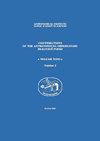改进了船底座QZ食双星四重子系统的物理性质
IF 0.2
4区 物理与天体物理
Q4 ASTRONOMY & ASTROPHYSICS
Contributions of the Astronomical Observatory Skalnate Pleso
Pub Date : 2020-03-01
DOI:10.31577/caosp.2020.50.2.580
引用次数: 0
摘要
利用四重系统QZ Car的79个光谱集合,我们能够-在光学领域首次-测量日蚀子系统Ac的两个组成部分的径向速度,并结合光度解决方案获得两个物体的质量和半径。我们确认Ac双星是一个半分离的系统,主星Ac1更亮,次星Ac2更大。基于ESO望远镜在La Silla和Paranal天文台的观测光谱,在076.C-0431(A), 081.C-2003(A), 083.D-0589(A), 089.D0975(A), 095.A-9032(A);程序TYCHO P2;BESO光谱和CTIO光谱,Hipparcos, ASAS3和我们的V光度测定。四重系统QZ Car 581改变了双星Aa和Ac的系统速度,使我们能够估计双星Aa和Ac的互轨道周期约为11700 d。初步改进了系统及其组成部分的基本性质。本文章由计算机程序翻译,如有差异,请以英文原文为准。
Improved physical properties of the quadruple sub-system with the eclipsing binary QZ Carinae
Using a collection of 79 spectra of the quadruple system QZ Car, we were able – for the first time in the optical region – to measure radial velocities of both components of the eclipsing subsystem Ac, and in combination with the photometric solution to obtain masses and radii of both bodies. We confirm that the Ac binary is a semi-detached system with a brighter primary Ac1 and a more massive secondary Ac2. Variations due to the light-time effect and secular * Based on spectra from observations made with ESO telescopes at La Silla and Paranal Observatories under programmes 076.C-0431(A), 081.C-2003(A), 083.D-0589(A), 089.D0975(A), 095.A-9032(A); the program TYCHO P2; on the BESO spectra and spectra from CTIO, and on Hipparcos, ASAS3 and our V photometry. † Pavel Mayer passed away on the day of his 86th birthday, Nov. 7, 2018 The quadruple system QZ Car 581 changes in the systemic velocities of both binaries, Aa and Ac, allowed us to estimate the period of mutual orbit of binaries Aa and Ac to be about 11700 d. Preliminary improved basic properties of the system and its components are provided.
求助全文
通过发布文献求助,成功后即可免费获取论文全文。
去求助
来源期刊
CiteScore
1.10
自引率
20.00%
发文量
4
审稿时长
>12 weeks
期刊介绍:
Contributions of the Astronomical Observatory Skalnate Pleso" (CAOSP) is published by the Astronomical Institute of the Slovak Academy of Sciences (SAS). The journal publishes new results of astronomical and astrophysical research, preferentially covering the fields of Interplanetary Matter, Stellar Astrophysics and Solar Physics. We publish regular papers, expert comments and review contributions.

 求助内容:
求助内容: 应助结果提醒方式:
应助结果提醒方式:


